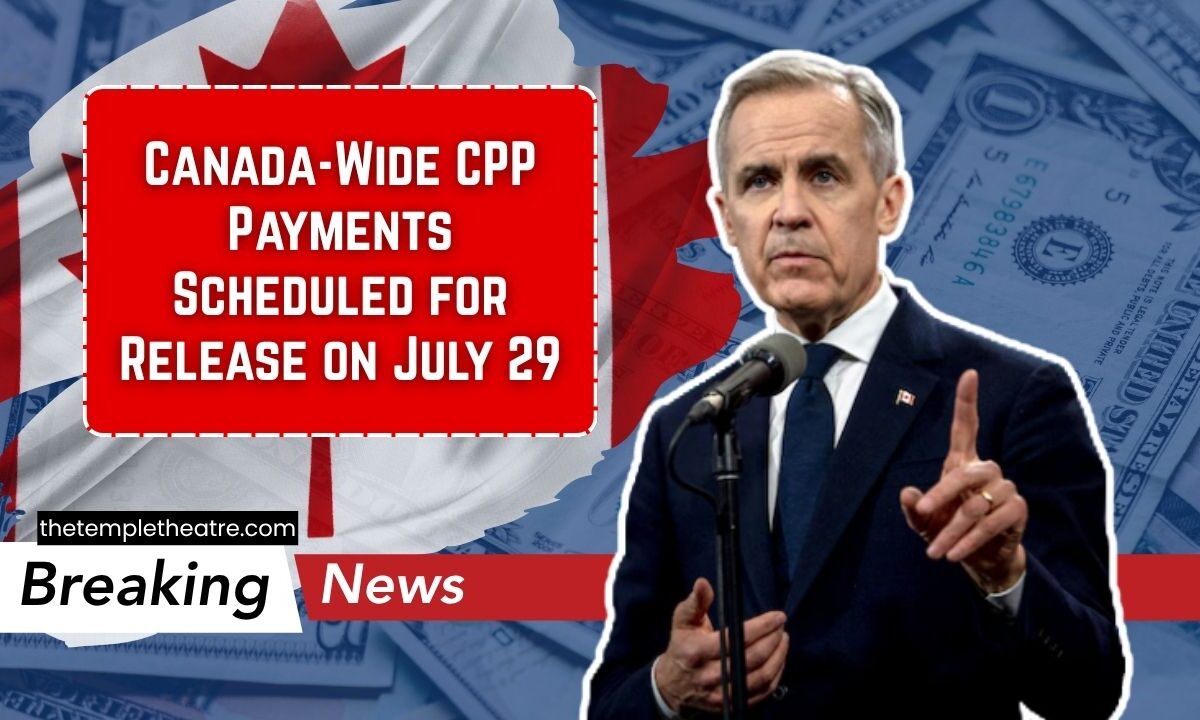As the cost of living continues to rise, Canadian seniors can expect financial relief with the next Canada Pension Plan (CPP) payment scheduled for Tuesday, July 29, 2025.
With a 2.7% increase to the benefit for 2025 and potential extra benefits of up to $800, now is the perfect time to explore what you’re entitled to and how to boost your retirement income.
When Will CPP Payments Be Made in July 2025?
The July 2025 CPP payment is set for Tuesday, July 29, and will be deposited directly into bank accounts for those enrolled in direct deposit.
If you still receive cheques, ensure that Service Canada has your correct mailing address to avoid potential delivery delays, especially in case of postal service disruptions.
Upcoming 2025 CPP Payment Schedule
Planning ahead? Here are the remaining CPP payment dates for 2025:
| Month | Payment Date |
|---|---|
| July | Tuesday, July 29 |
| August | Wednesday, August 27 |
| September | Thursday, September 25 |
| October | Wednesday, October 29 |
| November | Wednesday, November 26 |
| December | Monday, December 22 |
What’s Changing in 2025? CPP Payments Get a 2.7% Increase
Effective January 2025, CPP payments increased by 2.7%, reflecting adjustments tied to the Consumer Price Index (CPI). This helps ensure retirees can keep up with inflation for essentials such as groceries, healthcare, and housing.
This increase is part of the ongoing CPP enhancement plan, which aims to replace up to 33.33% of your average work earnings, compared to 25% before 2019.
- Maximum monthly CPP payment at age 65: $1,433
- Average monthly CPP payment: Approximately $900
How the Canada Pension Plan Works
The CPP is a federally-managed retirement income program funded by employee, employer, and self-employed contributions. It offers income to:
- Retirees
- Disabled contributors
- Survivors of deceased contributors
You can start receiving CPP as early as age 60, but starting early reduces payments by 0.6% per month (7.2% annually). On the flip side, delaying until age 70 increases your monthly benefit by 0.7% per month (up to 42%).
Once you begin receiving CPP, it’s adjusted annually for inflation and cannot be reduced.
Who Is Eligible for CPP Benefits?
To qualify for CPP, you must:
- Be 60 years of age or older
- Have made at least one valid contribution to CPP via employment or self-employment
Additional eligibility considerations include:
- CPP credit splitting post-divorce
- Post-Retirement Benefits (PRB) if you’re under 70 and still contributing
- International social security agreements can help immigrants qualify for CPP based on work history abroad
How Much Will You Receive in July 2025?
Your CPP payment amount is influenced by:
- Your age when benefits start
- Contribution history
- Average career earnings
CPP also excludes your lowest 17% of earnings years to account for times like unemployment or parenting.
| Category | Amount (Monthly) |
|---|---|
| Maximum Payment (Age 65) | $1,433 |
| Average Retiree Payment | $900 |
Extra Benefits You Could Receive in July 2025
You may qualify for up to $800 or more in additional support alongside CPP:
| Benefit | Monthly Amount (2025) | Eligibility Notes |
|---|---|---|
| Post-Retirement Benefit | Up to $49.39 | Ages 60–70, still working |
| Old Age Security (OAS) | Up to $727.67 (65–74) or $800.44 (75+) | Lived in Canada for 10+ years |
| Guaranteed Income Supplement (GIS) | Up to $1,086.88 | Income below $22,056 |
| Survivor’s Pension | Up to $859.80 | Spouse or partner of deceased |
| Children’s Benefits | $301.77 (full-time), $150.89 (part-time) | For dependents of contributors |
Disability and Survivor Benefits Under CPP
The CPP also supports Canadians facing hardship:
- CPP Disability Benefit: Up to $1,673.24/month
- Post-Retirement Disability Benefit: Up to $598.49/month
- Children’s Benefits: Up to $301.77/month for full-time students
- Survivor’s Pension: Up to $859.80/month
Note: If you qualify for multiple benefits, you’ll receive a combined payment, though the total may be adjusted to meet CPP rules.
Quebec Pension Plan (QPP): What’s Different?
Residents of Quebec contribute to the QPP, which mirrors the CPP in structure and benefit types. If you’ve worked in both provinces, contributions from each plan can be coordinated. QPP payments for July 2025 are set for July 31.
How to Apply for CPP Benefits
Applying for CPP is simple and requires a few key steps:
- Decide when to start (age 60–70)
- Apply online via My Service Canada Account (fastest)
- Or submit a paper application (may take up to 120 days)
- Have key documents ready, such as SIN and birth certificate
- Apply 6–12 months early to avoid delays
Why It Matters: Secure Your Financial Future
The 2025 CPP payment increase and extra income supplements like OAS and GIS come at a critical time when inflation continues to pressure Canadian households. These enhancements are vital to preserving the financial well-being of retirees.
Understanding your options, applying on time, and checking your eligibility for additional benefits can significantly improve your monthly income and quality of life.
Stay informed, plan early, and make the most of Canada’s retirement programs.
FAQs
Can I work while collecting CPP payments?
Yes, you can. If you’re under 70 and still working, you can continue contributing and receive the Post-Retirement Benefit (PRB) for additional income.
Is CPP income taxable?
Yes, CPP benefits are taxable, and you can request tax deductions or manage this when you file your annual return.
How do I estimate my CPP benefit amount?
Use the Canadian Retirement Income Calculator or log into your My Service Canada Account to get a personalized estimate based on your earnings and contributions.




